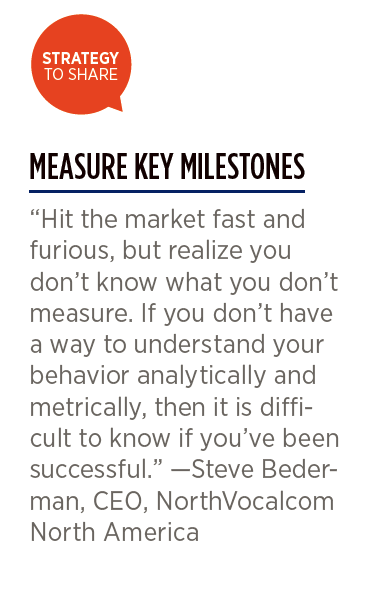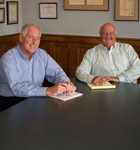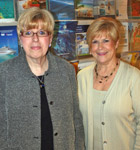Mutual benefits. In a nutshell, this is the simple, yet strategic, rationale behind the buzz-worthy partnership between two key players in the hosted-call-center service niche: TelStar Hosted Services, Inc., a multivendor hosted-call-center solutions provider with state-of-the-art communications as a service via the cloud, and Vocalcom, a leading call-center-technology solutions provider. After just over a year and a half in business, TelStar Hosted partnered with Vocalcom, which has 17 offices throughout the world and over 5,000 call centers and 650,000 agents using its system. The collaboration is intended to boost Vocalcom’s market share in North America and provide TelStar access to superior software. James (Jim) Dunn, CEO of TelStar Hosted, and Steve Bederman, CEO of Vocalcom North America, share their hopes for this critical alliance.
What inspired Vocalcom and TelStar Hosted to form a partnership?
Bederman: In May 2011, Vocalcom received a significant investment by Apax Partners, a leading private-equity firm. Vocalcom’s growth plans include building a major presence in North America. To achieve this, we searched for a fast and dependable entry option into the market with an established company that represented integrity and quality. After much due diligence, we found TelStar Hosted. They have a solid infrastructure, process, and the best customer service in the hosted-call-center service industry. We began discussing a partnership with them; it was a convergence of ideas at that time and it has been a wonderful combination.
Dunn: We learned a significant amount our first year. We realized the partnership would be beneficial to move our business to the next level. We are in an emerging industry, and more medium-to-large businesses are entering the hosted marketplace. We want to make sure we are working with best-in-class players. TelStar Hosted had the service side covered but we also wanted to offer superior software. And so, in August, we consummated a relationship with Vocalcom. TelStar Hosted is Vocalcom’s hosting partner for Vocalcom software in the cloud for the call-center industry in North America.
What does a typical day look like for you?
Bederman: Even though we are separate companies, most days Jim and I get together to discuss our collaboration and review our distribution model. We continually meet to ensure our two companies are working well together. In addition, I am actively putting the pieces in place to build an expandable, sustainable infrastructure for Vocalcom in North America.
Dunn: I spend a good part of my day with our functional teams. Every day, as a team, we go through our business from top to bottom. We are a service-delivery organization. We are focused on the blocking and tackling required to run a service business from the cloud.
How do you differentiate yourselves from the competition?
Bederman: We certainly are aware of our competition, but we understand the direction of the industry and have our own vision and strategic plan.
Dunn: One of our biggest differentiators is that most of our competitors write their own software. We aren’t a software house. Instead, we create a service and rely on best-of-breed software companies like Vocalcom. The communications-as-a-service industry is growing from about $400 million in 2008 to $2.5 billion by 2015 in the United States. It has huge growth potential. We are just now starting to see early adopters to companies with larger call-center infrastructures entering the market. Having healthy competition helps us to grow and educate the overall market
What advice would you have for others in your industry?
Dunn: Be serious about service. The biggest competition we have is clients choosing to do this internally rather than outsourcing the service. I think this economy will serve as a catalyst to bring more people to consider taking communication to the cloud, to avoid the capital expenditures for upgrades and rising maintenance costs. We need to show that we are professionals, that we care, and that we understand call centers better than [clients] do. That provides a great comfort level to clients that choose TelStar Hosted.
What kind of obstacles have you had to overcome in your career?
Bederman: While I’m a conventional guy in terms of process and metrics, I believe that many businesses establish strong rules that make management comfortable saying “no.” My way of looking at business is teaching people how to confidently say, “yes,” and to take action. Make decisions. Move forward.


